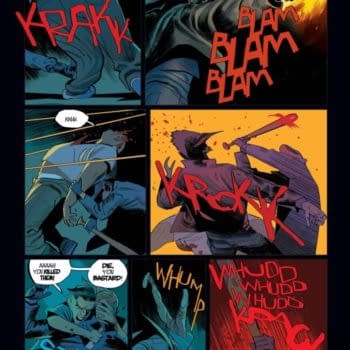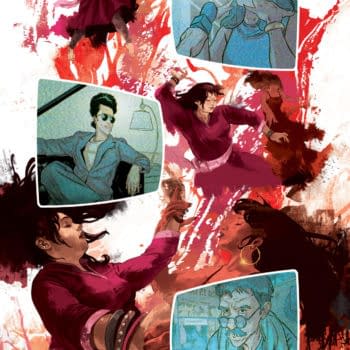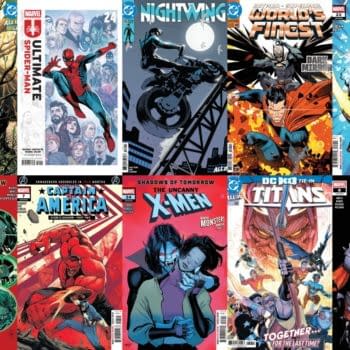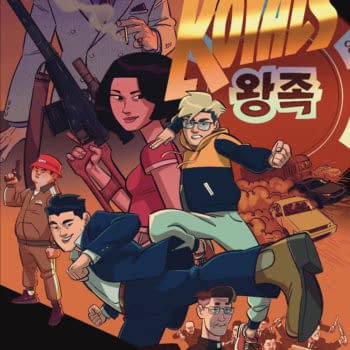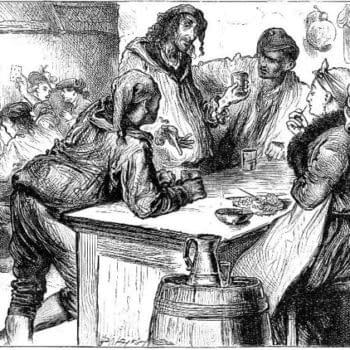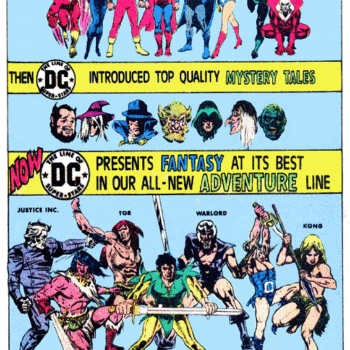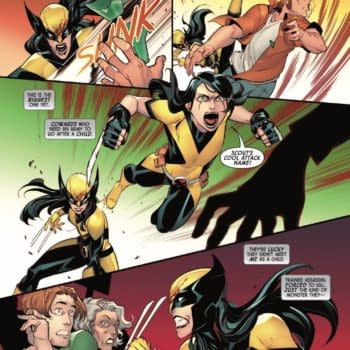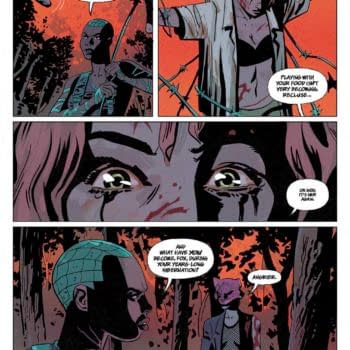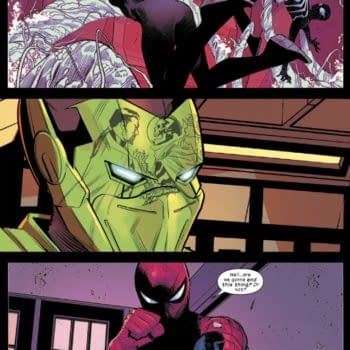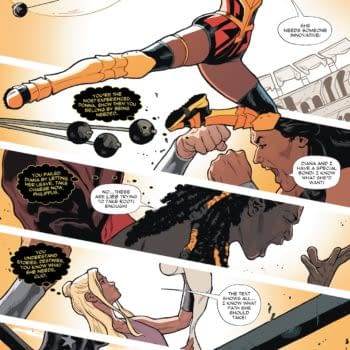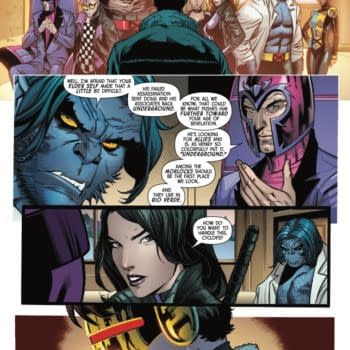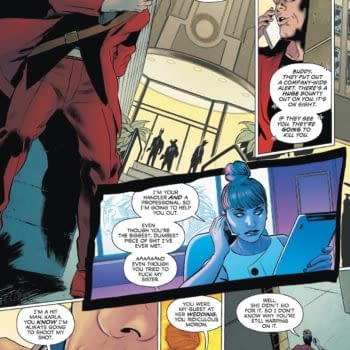Posted in: Comics | Tagged: before watchmen, Comics, Crimson Corsair, dc comics, len wein, Ozymandias, Watchmen
Talking To Len Wein About His Career, His Legacy And Before Watchmen
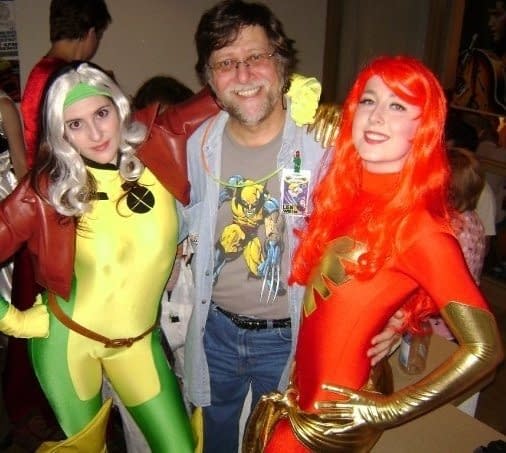
At this year's C2E2 I had the opportunity to sit down with comic industry legend, Len Wein. It was on the last day of the show and I was tired and a bit frazzled, but Mr. Wein showed no sign of wanting to slow down or move away from fans. Armed with some pens, a broad smile and more than a little wit, he had been cheerfully signing away since Friday, speaking with fans and answering their questions.
With that in mind, I tried hard to come up with different questions than he generally gets asked. This is not an easy thing to do as Wein has been in the industry for four decades and has been the subject of renewed interest in recent months, having made a major contribution to DC's Before Watchmen comics, writing Ozymandias and Crimson Corsair.
After we got comfy at his table in Artist's Alley, we began to speak between the many fans seeking his autograph…
Your wife (attorney, photographer and five-time Jeopardy champion Christine Valada) has called you one of the 'old gods' of comics. How do you see yourself in the industry after all these years? Can you now look back objectively? Is it something special, or is it just a 'job'?
Even though absolutely yes, it is a 'job', it's been my job and I never really thought of it as a job because to me, a job is work. I love doing this, and I have always thought that somebody actually pays me to do the thing I would love to do most in the world. That works out great. It keeps a roof over my family's head, but as to my place in history, I figure history will figure that out. It is very hard to figure out where you stand on your own and I think you can never look at it objectively. Shakespeare didn't imagine people would still be performing his plays over 400 years later.
Neil Gaiman says that the first time he fell in love with a writer was you on Swamp Thing. If you hadn't written Swamp Thing, it is possible that someone like Neil might never have written American Comics. Do you look at the people you have inspired as inheritors, or maybe usurpers?
Never as usurpers. I'm a usurper. I didn't start the business, I came in much later. On my Wikipedia page, Chris Claremont is quoted as saying that the entire face of comics in the second half of the 20th century would be radically different if not for my contribution; which I find very humbling and gratifying. I am often amazed at the numbers of people I meet, many prominent authors today, [when meeting me] say they became authors because of my work. Brad Meltzer is one, Neil is another. I met Joe Hill last year his first words were 'you're the reason I started [writing] comics.'
Hopefully it is something you like to hear regardless of who is saying it. You don't want to have to lie to someone that says you are their inspiration as a writer and you don't like their work.
You kind of walk this weird line with that sort of thing. There is sometimes that person that comes up to you and says, 'you are one of my two favorite writers, I think you are spectacular! You and…insert name here." And I [want to say] 'oh God, really?' because he is my least favorite or something like that. You sort of have to work around that, but as a rule of thumb I am very gratified by the response I get from the fans.
Back to your Wikipedia page, one of your early ambitions in the industry was to be an artist. What was the Damascus moment that made you say maybe writing would be better?
Yeah, all my majors were in art. Well, the editors wanted to hire me as a writer, but not as an artist. It was literally that simple.
Do you find yourself doodling to create the stories?
I do doodle, but not to write then as it is all in my head now. But I still do occasional sketches or doodles just to keep my hand in. Part of the reason I work so well as a writer in comics is that I see it in my head. I have artists all the time say that they knew exactly what I wanted from the description.
Do you still read and collect comics today? I know a lot of pros that don't anymore.
I still read, I don't collect like I used to. I don't read as much as I used to either. I find some of the stuff harder to read. But there are some I really like. I love Mark Waid's stuff. I'm reading Daredevil; I'm reading Indestructible Hulk and Green Hornet. There are others, I read the Justice League and the Bat-books; I will probably always read the Bat-books.
This is sort of a geek question for me. We all have a single comic that we never fall out of love with, one that never ages badly and it is as good every time we read it as we remember it being the first time. Do you have that as a fan?
It is gonna sound weird, I read a story when I was a kid which may be the only comic book story that ever made me cry. Another one I remember was the first Metal Men story. But that first one was an issue of My Greatest Adventure and a story called 'I was the last Martian' it was a story that just broke my heart as a kid. Those are the best kind of stories. (My recollection of the story was not as strong, but I knew I had read it at some point. It is in My Greatest Adventure number 20)
Did you ever have any big run-ins with the Comics Code?
The only one I can think of, the very first issue of Swamp Thing. Originally there is the explosion in the lab and he come racing out down the dock engulfed in flames, and the Code said 'No you can't do that.' So I took it back and I had the coloring changed slightly and I re-wrote the line to say 'engulfed in FUMES'. I think that may be the only time I ever recall, oh wait, that's not true. Six issues into Swamp Thing, the Comics Code calls up in a panic. They are going 'you are gonna have to change the book!' I asked why? 'Well we just looked at the book and we suddenly realized he's naked!' And we went, 'Yeah, so?' [They responded] 'He can't be naked!' [Again] 'Why?' They said, 'Well the obvious reasons.' We told them to go back and look at the first six issues, and find us a panel where that is a problem. The way we were doing it, he was always in shadow from 'mid-here to mid-there'. The Joe Orlando got involved, he came to the offices with every issue to date and every page and asked them to show him where this was a problem. They said to just make sure that they keep him in shadow, [to which Joe replied], 'We've been doing that!'
Over the years you have had many thing converted to other mediums, and I have another geek question. The Human Target: Rick Springfield or Mark Valley?
Oh Mark Valley. (laughs) That early in my career, I was thrilled to have the TV show. Now everyone says 'But they changed it all in the second version.' Let me put it this way: If you hire Mark Valley to be your star, you really want to cover him up with make up for most of every episode? I think he did a great job. I love [them]. Chi McBride is a great guy; I have become good friends with Jackie Earl Haley. You make changes. One of the things I try to teach when I'm teaching a writing class or talking to would-be writers is always to remember to write for the medium you are in. Every medium has different requirements and you cannot be high-bound by 'but it was this way in the original and you can't change it'. Of course you can, you have to sometimes. How I got into television was very much that way. The first thing I did was adapting one of my own Batman stories to the original Batman animated series. They were very reluctant to use me but they felt an obligation because of my connection to the character. But when I turned in the script, I had made all sorts of changes and they were stunned. They asked why, and I said that this makes a better television show and the other way made a better comic, and you write for the medium you're in. And they went "Ooh! Would you like to write more?" And I did another half dozen episodes. I went from 'We only have one episode available' to 'how many can you handle?'
Another perspective beyond the "old god' one is something that you said. You said that guys like you and Neal Adams were the ruination of this industry.
I DID say that??Where did I say that? (It was in the DVD documentary Secret Origin: The Story of DC Comics. If you have not seen it, go get it!) Well, it stopped being a business and became more of an adventure when we came in. We were not the type to follow the rules, and I think that helped open the industry a lot and I think it made it more creative and just a little less a business. Before our generation, you came to the office in a suit and tie and everyone was there like a grown up doing business and I came in dressed [in jeans and T-Shirt] like this and there is Julie in a jacket and tie, bless him!
He (Julius Schwartz) is another one that you have to classify as vital to the industry. If you are on the list, he is on the list.
If I'm on the list he is at the TOP of the list. Without him there would be no comic book fandom, which is what led to me and Marv (Wolfman) and all kinds of guys coming in. Without him there would be no Marvel Comics either. He was almost single handedly responsible for the Silver Age.
In the 1970's there was a wonderful rotating door at Marvel, which you were part of as the Editor-in-Chief. They just whipped people in and out at a high rate after Stan Lee was done. Was there anything about that era that you would take back, or that you were particularly liked?
Well, it wasn't just whipping them in and out. Given their druthers they would have kept whoever was there forever until there was a desiccated husk lying on the ground. But all of us were sane enough and young enough to know that it was impossible job and walk away from it one after the other.
Until Jim Shooter came in, and for good or ill, kicked some ass for many years in the job.
A little bit of both, and forced them to do what they would never do under any of the previous EiCs, which was to just break up the lines so that there were editors for each manageable bunch of books. I liked it the old way because no one was on my case, and I was also that way at DC for a while. When I was EiC, I was responsible for more than 54 books a month! That is insane! You can't do that much in a month, though we tried. And the longer we didn't fall flat on our faces, the more 'upstairs' would not believe that It couldn't be done.
The list of characters you have created or co-created is impressive. Are there any of them in particular that since leaving them, you have particularly liked where other writers have taken them? I know you have said something similar about Claremont on the X-Books.
Yeah, I could never have stayed 17 years on one title. He did a wonderful job on it.
Your generation of creators has had a lot of renewed popularity and resurgence in careers. You took several years out of comics to work in other mediums. Is Before Watchmen a one-off or is it the first of many new comics?
I did, for about a decade I was in television.
(It was at this point that a fan came up and we lost the thread for a few minutes so, we never got back to that question. Len was asked about a book and the topic of the Eisner Awards came up, and he smiled broadly…)
It drives me crazy, I'm in the Eisner Hall of Fame and yet I've never been nominated for a regular Eisner. (laughs) We've all got egos, I've done some work in the last few years especially, that I thought was at least worthy of nomination, Legacies, Before Watchmen. Man if you think I suck God knows everyone loved Jae's art, but nothing! Weird.
I have one last question and if I forget to ask it, Rich Johnston will hunt me down. What happened to the Before Watchmen epilogue and Crimson Corsair?
(Long pause) The Before Watchmen epilogue became, I think, a matter of practicality. While everything was on time and we were putting out a book a week, everything seemed great. As we go to the second half of the project and everyone, not everyone, I should say the artists; to the best of my knowledge all of the writers were on time all of the time. But the artists in some cases started missing their deadlines right and left and the powers that be said 'why do we want to subject ourselves to more aggravation?' and decided to just pass on the epilogue. It was also that we had pretty much told all the story we needed to tell or wanted to tell in the regular books and all the epilogue was going to be was addendums and a lot of aggravation.
Its proposed existence never made sense to me since the Before Watchmen epilog would essentially be Watchmen; Ozymandias in particular was like that.
Yeah, the last panel of ours was the first panel of Watchmen as far as seeing the character.
The Crimson Corsair is a whole other story. I had started to work with John (Higgins), and I had no clue what a good artist he was. I was very excited and we were about halfway through the project, and I said we are going here next and John had his own ideas of where he wanted to go. He started to get more and more determined in what he wanted it to be, and it wasn't the story I wanted to tell. I don't know if this part is true as I think it is hearsay that he went upstairs and wanted to do it his way or he was off the book. DC would have been clear on the idea that it was just him and I in the new teams that had any direct connection with the original work so they came to me and said how do you feel about this? Well, I wasn't happy about it. It was my creation and I had a story I wanted to tell. I understand, of course, but that is the way things are sometimes. DC told him to finish it, but to do so as quickly as possible please. DC decided not to carry it through the backs of all the books like they originally intended. And now it sort of stops half way through the project and ends there. I think that is unfortunate. Everyone generally worked well together, sending each other all their work to see and bounce off of. A lot of my stuff meshes so well with the other books because I got Joe Straczynski's scripts, Brian's scripts and Darwyn's scripts so I could see what was going on and see where I could mesh and when they were not ahead of me in the story they were telling I could let them know that I was about to do a scene, and how does that fit with what you are doing? Everybody worked together for the most part, so this was a bit sad to me. A creator cares deeply about something and believes they are right and they stand their ground. They are completely right to think they are right and this was not different. He just was a different kind of right. He wasn't hired to write the book he was hired to draw it. We all have egos and you try to work it out, but it kept getting farther and farther away from what I intended, and in the end I'm still not sure what happened and how it ended.
Taylor Ramsey is a regular contributor and Assistant Editor at The Artifice. He writes about comics and the industry and is patiently waiting for the Xemnu movie.






